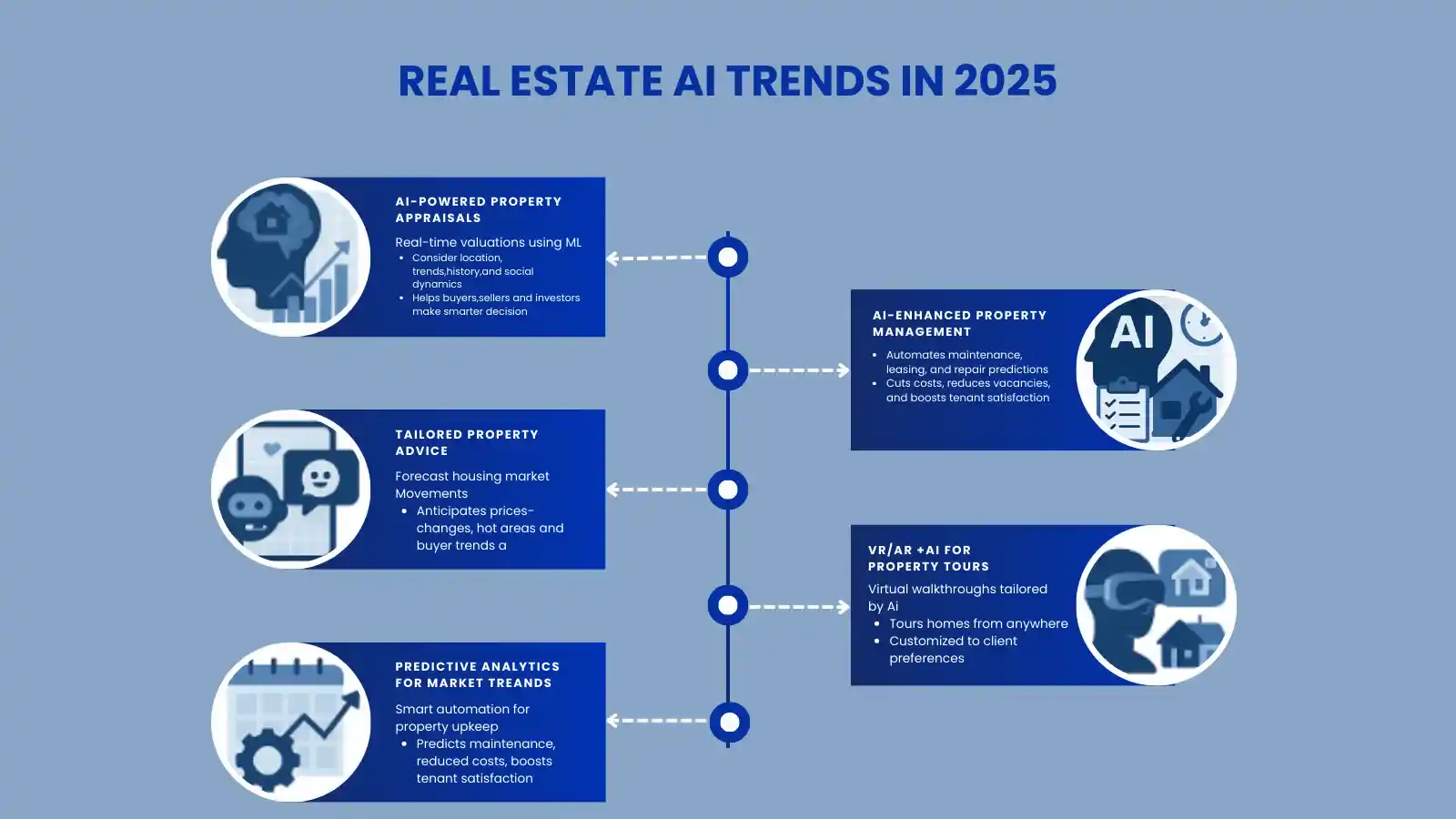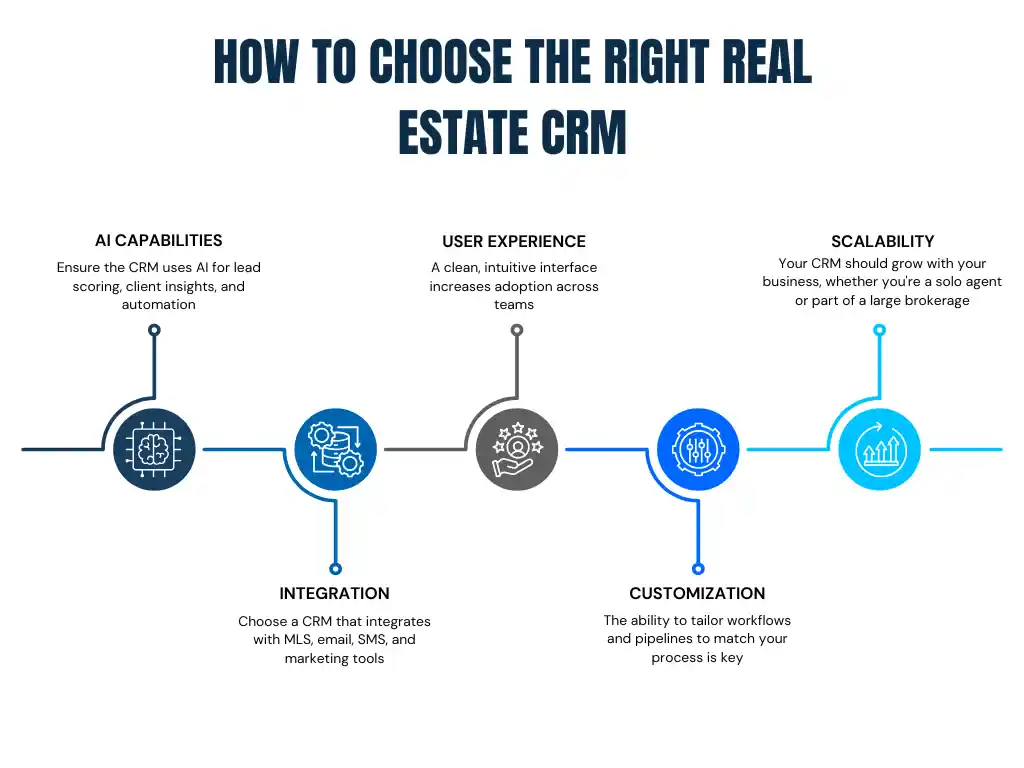Table of Contents
The real estate market is changing fast in 2025, and Artificial Intelligence (AI) is leading the way.
AI helps agents, brokers, and investors work better by speeding up deals, spotting market trends, and giving clients a more personal experience. One key change is how real estate CRMs now use AI to handle leads, build client relationships, and boost productivity.
In this article, we’ll look at the top trends, tools, and real-world uses of AI in real estate, especially how CRMs are growing to meet the needs of the future.
What is CRM for Real Estate?
A real estate CRM helps agents track clients, schedule follow-ups, and store property details in one system.
In 2025, AI-powered CRMs go beyond basic tasks. They now offer tools like lead scoring, smart property suggestions, and real-time message tracking.
Why Real Estate AI Matters in 2025
In 2025, Real Estate AI transforms the sector by making processes faster, data-led, and very efficient. AI is taking over slow and repetitive tasks. It helps speed up property pricing and gives clients more personal service.
By studying large amounts of data, AI helps real estate businesses make smarter choices, reduce risk, and set better prices for buying and investing. Similarly, AI for insurance agents enables data-driven decision-making by analyzing risk profiles, predicting client needs, and personalizing policy recommendations—demonstrating how AI is transforming both real estate and insurance industries.
AI also makes housing more affordable. It gives people more freedom to move and helps small businesses compete with larger ones.
As AI keeps growing, it will continue to change how properties are bought, sold, and managed—bringing big changes to the entire industry.
The Evolution of Real Estate AI
Past to Present: A Brief Timeline
- At the beginning, real estate AI only consisted of rudimentary tools such as Multiple Listing Services (MLS), which enabled agents to query property databases in an efficient manner.
- Basic data analysis using rule-based algorithms helped assess property values according to location, size and rudimentary market trends.
- As the years went by, AI software advanced. In the 2010s, algorithms for machine learning dominated the process of improving real estate valuations, making more accurate predictions based on larger data records. Real estate companies now include AI in their CRM platforms (customer relationship management).
- This has improved automated lead generation and customer interaction. By 2020, predictive analysis became popular, aiding investors in predicting market trends and selecting lucrative opportunities.
2025 and Beyond
- In 2025, Real Estate AI is driven by more advanced algorithms, providing a clearer view on market trends. Cloud computing makes it easier to store data and enrich more, making it easier to grow real estate companies.
- Integration with the Internet of Things (IoT) creates intelligent properties that collect real data from energy consumption to safety to achieve improved decision-making capabilities.
- Cloud computing not only makes AI real estate companies easier, but also makes it possible to search for real estate created by tailors, but also makes it easier to store and enclose data. AI leads to almost every facet in the real estate process.
Key Real Estate AI Trends in 2025

AI-Powered Property Appraisals
AI will transform property appraisals in 2025 through machine learning models that take into account location, trends, past history, and even social dynamics such as local developments or sentiment. AI-powered models give precise real-time valuations, which inform buyers, sellers, and investors about making better decisions.
Tailored Property Advice
Recommendation engines and AI chatbots will become more reliant on users’ search history, preferences, and past behaviors to provide recommendations. By doing so, the system helps potential buyers find homes that match their actual needs, making property hunting a more personalized and efficient process.
Predictive Analytics for Market Trends
Recommendation engines and AI chatbots will become more reliant on users’ search history, preferences, and past behaviors to provide recommendations. By doing so, the system helps potential buyers find homes that match their actual needs, making property hunting a more personalized and efficient process.
AI-Enhanced Property Management
AI tools will help property managers automate maintenance schedules, predict repair needs, and streamline leasing processes. These systems will reduce operational costs, minimize vacancies, and enhance tenant satisfaction through data-driven insights, transforming property management into a more efficient, proactive endeavor.
Virtual & Augmented Reality (VR/AR) with AI
The integration of AI with VR and AR technologies will provide virtual property tours. AI will customize these tours according to client preferences, enabling buyers to virtually tour properties, saving time and offering an enhanced viewing experience.
Real Estate AI Tools Transforming the Industry
Here’s a quick snapshot of tools making the biggest waves:
| Category | Tool/Platform |
|---|---|
| Property Search | Zillow AI, Compass |
| Valuation | HouseCanary, Quantarium |
| Virtual Tours | RoOomy, Styldod |
| Chatbots | Structurely, Tidio |
| Investment | ReAlpha, Skyline AI |
| Transactions | Propy, Docusign AI |
Zillow’s AI and Zestimate
Pricing: Free for users; Zillow generates revenue through advertising and premium services for real estate professionals.
Best Features:
- Automated Valuation Model (AVM): Provides estimated property values for over 160 million homes using data from public records, MLS listings, and user submissions.
- Easy-to-Use Interface: A simple map and detailed search results help users find homes quickly and easily.
- Continuous Updates: Regular algorithm updates aim to improve the accuracy of Zestimates.
Reonomy: AI-Driven Commercial Real Estate Insights
Pricing: Free trial available. Paid plans start at about $49 per month. Custom pricing is offered for large businesses.
Best Features:
- Comprehensive Data Analysis: Utilizes AI to analyze vast datasets, including property details, ownership records, transaction histories, and market trends.
- Commercial Real Estate Focus: Specializes in providing in-depth insights into the commercial real estate market, aiding investors in making informed decisions.
- Predictive Analytics: Helps identify emerging opportunities and predict property performance more accurately.
OpenAI’s Language Models in Property Marketing
Pricing: Free tier available; premium plans (e.g., ChatGPT Plus) start at $20/month.
Best Features:
- Content Generation: Automatically generates personalized property descriptions, advertisements, and social media posts tailored to specific client profiles or market segments.
- Time Efficiency: Saves time for real estate agents by automating the creation of marketing materials.
- Consistency and Quality: Ensures each listing stands out with unique, high-quality content that reflects the brand’s tone and professionalism.
PropertyNest and AI in Leasing
Pricing: Offers a free basic plan; premium features and services are available with subscription plans starting at approximately $29/month.
Best Features:
- AI-Driven Leasing Automation: Analyzes tenant preferences, behaviors, and property characteristics to match tenants to properties more efficiently.
- Reduced Vacancy Times: Optimizes leasing strategies, leading to faster occupancy and improved tenant experiences.
- Enhanced Tenant Experience: Streamlines the leasing process, making it more effective for both property managers and renters.
Best CRM Tools for Brokers in 2025
Real estate professionals now rely on AI-enhanced CRMs to stay competitive. Some of the best CRM tools for brokers in 2025 include:
- HubSpot CRM (Real Estate Edition): Now with AI-powered client scoring and automated email flows.
- Follow Up Boss: Offers predictive lead scoring and integrates with AI chatbots for faster client engagement.
- LionDesk: Features AI voice assistants and workflow automation.
- Zoho CRM for Real Estate: Enhanced with AI insights, smart task suggestions, and dynamic dashboards.
These tools help brokers manage relationships more efficiently and close deals faster by leveraging real-time data and intelligent automation.
How to Choose the Right Real Estate CRM

Choosing the right CRM can feel overwhelming. Here’s what to look for in 2025:
- AI Capabilities: Ensure the CRM uses AI for lead scoring, client insights, and automation.
- Integration: Choose a CRM that integrates with MLS, email, SMS, and marketing tools.
- User Experience: A clean, intuitive interface increases adoption across teams.
- Customization: The ability to tailor workflows and pipelines to match your process is key.
- Scalability: Your CRM should grow with your business, whether you’re a solo agent or part of a large brokerage.
Using these tips will help you identify the best real estate CRM for your needs.
Game-Changing Use Cases of Real Estate AI in 2025
Smart Property Search and Discovery
In 2025, AI will revolutionize the process of searching for property. Buyers and tenants will be able to utilize sophisticated AI tools that combine voice search, image recognition, and dynamic filtering to discover properties that exactly fit their requirements.
For instance, real estate AI systems can scan an image on a magazine or social media, and immediately search for properties with similar features. This eliminates the hassle of users going through hundreds of listings and gives a more intuitive and personalized search experience.
AI-Driven Real Estate Investment Tools
AI will help investors make smarter choices by looking at market trends, past data, and economic factors. It will predict property price changes and returns, and suggest the best investment options that could be missed.
Automated Property Appraisals
AI systems will be able to generate instant property appraisals based on location, market conditions, comparable sales, and even environmental factors.
This reduces the delays in conventional appraisal procedures and delivers more precise, current property values to buyers, sellers, and investors. Time-saving and the risk of human error are minimized through automated appraisals. It’s a helpful shift—especially in situations where I’m trying to sell my house fast and can’t afford to wait on slow, manual evaluations.
Chatbots and Virtual Assistants for Client Interaction
AI-powered virtual assistants will handle customer inquiries, schedule viewings, and follow up with potential buyers or renters. These assistants can provide instant responses to queries, ensuring personalized, 24/7 communication, while also gathering valuable data about client preferences to enhance future interactions.
Automated Contract Management
AI software will automate the preparation, checking, and maintenance of legal documents that are part of real estate deals. The systems will highlight issues, verify compliance, and generate contracts faster with less need for human legal input and accelerating the entire transaction process. This will also reduce expenses and enhance precision in legal documents.
FAQ
Do real estate agents need a CRM?
Yes. A CRM helps manage client relationships, set up follow-ups, and keep property details organized. By 2025, with AI added, CRMs will predict leads, send personalized messages, and close deals faster. Whether you’re an independent agent or part of a large brokerage, a CRM helps you stay efficient, organized, and competitive.
Most top AI CRMs in 2025 use strong encryption, secure cloud systems, and privacy rules (like GDPR and CCPA) to protect client data and keep it safe.
How much does a real estate AI CRM cost in 2025?
Costs vary by features and scale, ranging from free versions with basic tools to enterprise-level platforms costing $50–$300/month per user. AI features often come with premium plans.
Do small real estate teams benefit from AI CRMs?
Absolutely. AI CRMs help small teams save time, automate workflows, and compete with larger firms by offering the same level of smart, personalized client service.
What is the role of AI in real estate lead generation?
AI helps identify high-potential leads by analyzing user behavior, demographics, and market data. It can automatically score leads, personalize follow-ups, and even predict which leads are most likely to convert.